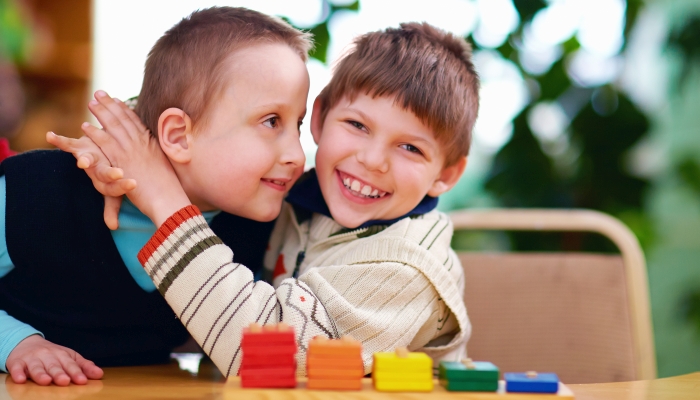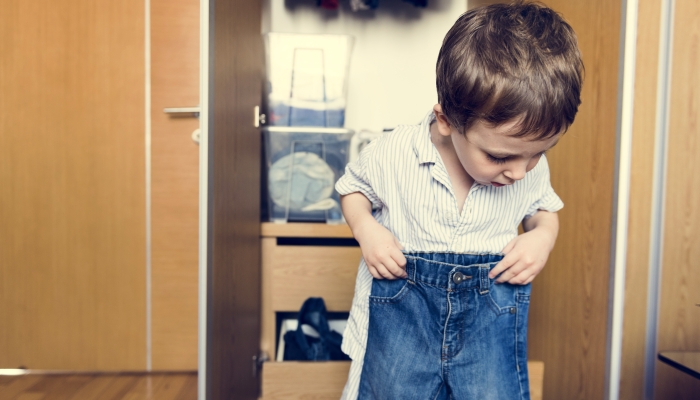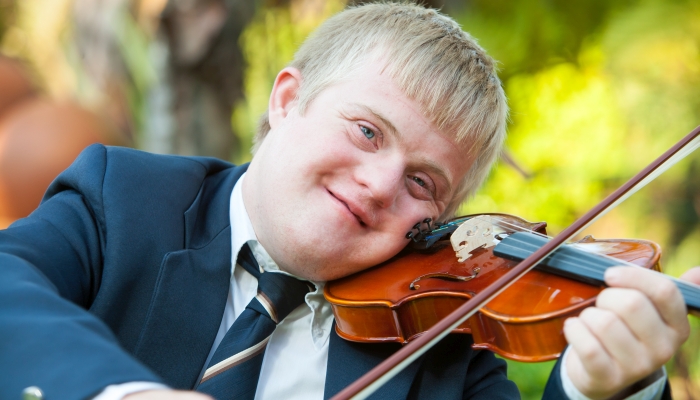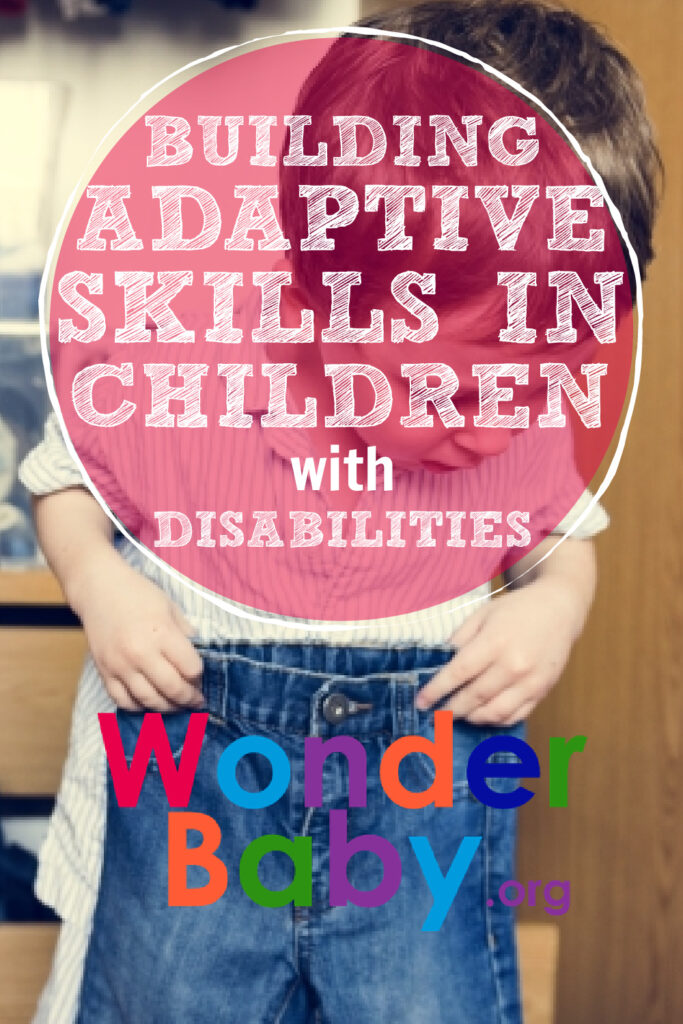Building Adaptive Skills in Children with Disabilities

- Adaptive skills are the practical skills individuals need to be independent.
- Problems with adaptive skills can be identified by parents and assessed by a professional.
- Children can improve their adaptive skills with time, patience, and guidance.
- Every child learns and grows at their own pace.
- Consulting a professional can help you set realistic goals for your child.
Every child needs to learn adaptive behavior. Adaptive behavior refers to actions used by people of all ages in everyday life. These life skills are important for home or school living.
Building adaptive skills in children with disabilities gives them independence. These skills help them interact with peers, perform self care, and take personal responsibility for behavior.
As children get older, they will develop the ability to live independently. Most adults are able to maintain full time employment. Parents of children with special needs may need to adjust their expectations. You will want to learn as much as you can about your child to help them set and achieve realistic goals.
What are Adaptive Skills?
Adaptive skills are life skills that allow people to function with independence. There are several different categories of adaptive skills.
- Self Care: Self care is the ability to bathe, feed, groom, and dress yourself. These are daily living skills that protect one’s dignity.
- Communication Skills: Communication skills include using verbal, non verbal, and written communication. Conversation skills are used to build interpersonal relationships in everyday life.
- Social Skills: Social skills are the ability to have healthy social interaction with others. This requires obeying rules, understanding emotions, following social cues, and understanding fairness.
- Home or School Living: Home or school living skills include completing chores to maintain one’s environment or living space. Cooking, cleaning, and organization are other home living skills. For older children and adults, this also includes managing money.
- Community: Community skills are necessary for independently using community services like public transportation.
- Self Direction: Self direction is an adaptive behavior that allows your child to tackle problem solving. This includes planning activities and exercising choice.
- Functional Academics: Functional academic skills include learning reading, writing, and math skills. A child should be able to apply these skills to daily living.
- Work: Work skills include the ability to meet work standards. This will help your child maintain part time or full time employment. This also includes taking responsibility, finishing tasks on time, and making money.
- Health: Health skills are used to identify health problems and having the ability to find help when needed.

How to Identify Adaptive Skill Problems in Children
All children need help when they are young. Infants and babies have very little independence. As they grow, they need less support from their caregivers.
Each child will develop adaptive skills at a different pace. Your child may excel in reading but struggle with self care. Children who struggle with adaptive skills do not necessarily have developmental disabilities.
If you feel that your child is behind in their adaptive behaviors, ask a professional for help. A healthcare provider can do an assessment of your child’s behavior. They might also give you a questionnaire to find out more about your child.
The Street Survival Skills Questionnaire (SSSQ) was developed in 1983 to assess adaptive skills in young adults. It includes questions about self care abilities and social interaction.
The SSSQ can be a good starting assessment. If you have concerns about your child, have several people assess their behavior. They can watch their behavior over time. This gives them a better idea of problems and patterns you are dealing with
Adaptive Skill Issues in Children With Disabilities
Children with and without diagnosed intellectual disabilities can have adaptive skill problems. All children can improve their adaptive skills if they have support from their parents, teachers, and other caregivers.
Causes of adaptive skill challenges in children
Some children develop adaptive skills slower than others. This is not a cause for concern.
Some children have developmental disabilities that make it difficult to develop adaptive skills. These children may need more support from parents and teachers. Common reasons for delays in adaptive skills include:
- Premature birth
- Genetic disorders
- Intellectual disability
- Nerve or muscle disorders
- Developmental diagnosis
Depending on the reason for the delay, it is possible for a child to gain independence as an adult.
Impact of adaptive skill challenges
Adaptive behavior challenges have an impact on both a child and their caregiver. Adaptive skill problems are frustrating for a child. Parents should provide opportunities for their child to gain independence wherever possible.
Behavior problems at school are often caused by poor adaptive skills. Students who have trouble following rules, problem solving, and understanding responsibility often also struggle with functional academics.
Poor self care behavior leads to poor health; Problems with chores lead to problems meeting work standards; Children who have a hard time understanding emotions may have more negative social interactions.
Adaptive skills impact every part of a child’s life and carry on into adulthood. With professional help, children can improve their abilities.
Can Adaptive Skills Be Taught?
Any person of any age can learn new adaptive skills. In fact, every person should seek to improve these skills through adulthood.
Children learn adaptive skills by watching their parents and mimicking their peers. They also learn them from teachers at school and by interacting with people in the community.
Children with an intellectual disability are capable of learning adaptive skills. They will simply need more time and special instruction. These children need schools and teachers with special needs training.

Ways to Develop Adaptive Skills in Children With Disabilities
Helping your child learn to do what they can for themselves will give them confidence. Confidence leads to higher self esteem and happier children.
Understanding the cause of the problem
If you have a child struggling with adaptive skills, you’ll first need to find out why. Seeking help from a school psychologist or healthcare provider can help with this.
Understanding your child’s specific intellectual disability can help you manage your expectations. An expert in child development can help you set goals with your child. You must first understand what is normal or concerning for your specific child.
Provide opportunities for independence
It is hard for parents to allow their children independence. It is faster to tie your child’s shoes than to let him do it alone. Problem-solving for your children saves them from pain in the moment.
Helping children too much with their daily tasks prevents them from growing. Parents need to give their children opportunities to fail and learn.
This is especially difficult for parents of special needs children. As long as they are safe, it is okay to let your child work through problems on their own.
Simplify tasks
Children may get overwhelmed and give up on a task if it is too hard. You can help your child without doing the work for them.
- Focus on one skill at a time.
- Break down chores into simple steps.
- Talk children through self care without physically heping.
- Ask your child which tasks they want to do themselves.
- Plan ahead to give your child extra time to accomplish a task.
- Limit your child’s choices to two or three to avoid overwhelm.
When to Consult a Therapist
Your pediatrician should ask you about your child’s milestones at each check-up. All children are different, but if your child seems to keep falling further behind, it’s time to ask for help.
Missing multiple important developmental milestones is a sign that your child may need help. You can use a developmental chart to track your child’s progress.
There are many different types of therapists. If you decide to use a therapist, make sure you are choosing one that will meet your child’s needs.
Occupational therapist
An occupational therapist helps people with motor skills. They help children with self care tasks like brushing their teeth or combing their hair.
Occupational therapists can help all children, regardless of their cognitive and physical ability. They can help with large motor skills like walking or fine motor skills like writing.
Physical therapist
If a physical problem is to blame for your child’s adaptive issues, a physical therapist can help. A physical therapist uses exercise and massage to work through injuries. They can also help children with low muscle tone.
Your physical therapist can also help your child with braces or splints to improve their mobility.
Applied behavior analysis
Applied behavior analysis (ABA) is relatively new. This type of therapy is often used for children on the autism spectrum.
ABA teaches children appropriate social interaction skills. It helps them with things like understanding fairness and obeying rules. This can help them interact with peers and make friends. This can help reduce social anxiety.
FAQs
Can an intellectual disability be cured?
Intellectual disability is not a disease and cannot be cured. However, a child with an intellectual disability can gain the skills needed to succeed in their daily life. With early intervention, your child can reach their highest level of functioning.
Does my child need to be in a special education class?
A pediatrician or school counselor can help you decide if your child needs special education placement. If your child’s intellectual disability is mild, they may be able to manage in a regular classroom. Your school can help you find early intervention programs to help your child if they need it. If your child does need special education, you will need to apply for an Individualized Education Program.

The information WonderBaby provides is not intended to be, and does not constitute, medical or other health advice or diagnosis and should not be used as such. Always consult with a qualified medical professional about your specific circumstances.
Related Posts

Eye Conditions and Syndromes, Visual Impairment
Neuralink Announces Plans to Restore Sight to the Blind with Brain Chip
Elon Musk’s company Neuralink has announced plans to begin human trials of its new “Blindsight” brain chip by the end of 2025.

Special Needs
5 Spring Cleaning Tips for Families of Children with Disabilities
Spring cleaning is an opportunity to create a more accessible, organized, and supportive space for your child with disabilities. Declutter, deep clean, and refresh!

Visual Impairment
The Gift of Understanding: How a Young Child Helps His Blind Father Navigate Life
When a parent is blind, it’s natural for people to wonder how their sighted child will adapt. Will they struggle to understand their parent’s needs? Will they feel burdened by...